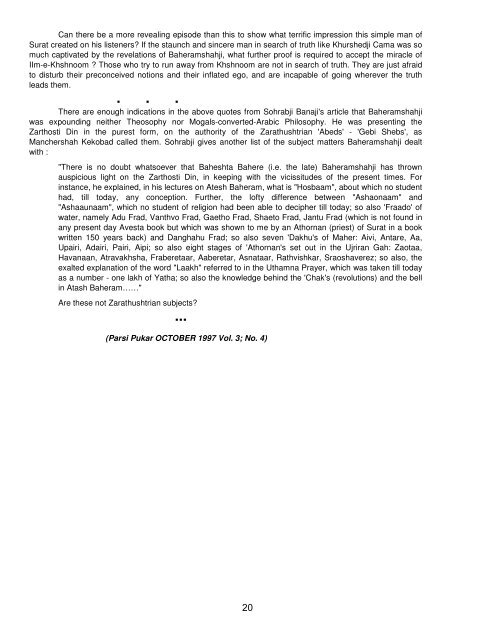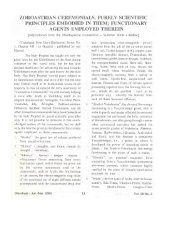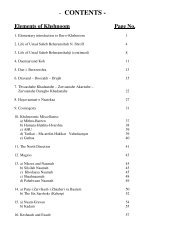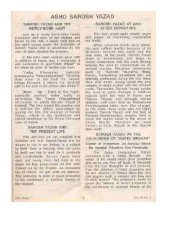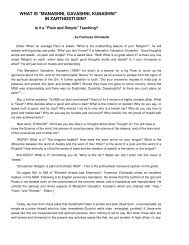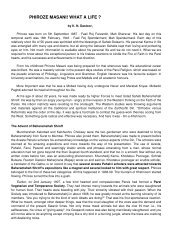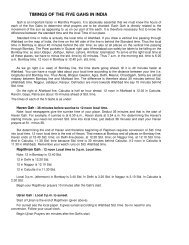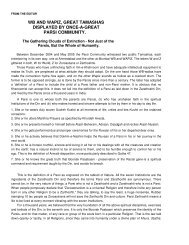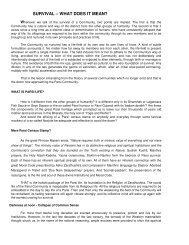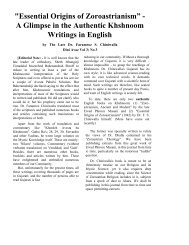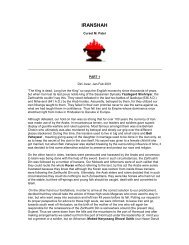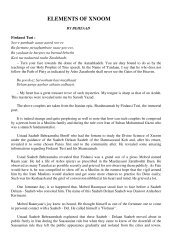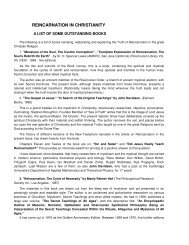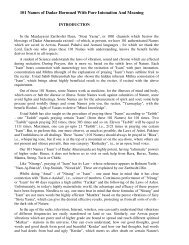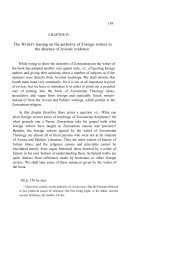Ilm-e-Khshnoom - Traditional Zoroastrianism: Tenets of the Religion
Ilm-e-Khshnoom - Traditional Zoroastrianism: Tenets of the Religion
Ilm-e-Khshnoom - Traditional Zoroastrianism: Tenets of the Religion
You also want an ePaper? Increase the reach of your titles
YUMPU automatically turns print PDFs into web optimized ePapers that Google loves.
Can <strong>the</strong>re be a more revealing episode than this to show what terrific impression this simple man <strong>of</strong><br />
Surat created on his listeners? If <strong>the</strong> staunch and sincere man in search <strong>of</strong> truth like Khurshedji Cama was so<br />
much captivated by <strong>the</strong> revelations <strong>of</strong> Baheramshahji, what fur<strong>the</strong>r pro<strong>of</strong> is required to accept <strong>the</strong> miracle <strong>of</strong><br />
IIm-e-<strong>Khshnoom</strong> ? Those who try to run away from <strong>Khshnoom</strong> are not in search <strong>of</strong> truth. They are just afraid<br />
to disturb <strong>the</strong>ir preconceived notions and <strong>the</strong>ir inflated ego, and are incapable <strong>of</strong> going wherever <strong>the</strong> truth<br />
leads <strong>the</strong>m.<br />
. . .<br />
There are enough indications in <strong>the</strong> above quotes from Sohrabji Banaji's article that Baheramshahji<br />
was expounding nei<strong>the</strong>r Theosophy nor Mogals-converted-Arabic Philosophy. He was presenting <strong>the</strong><br />
Zarthosti Din in <strong>the</strong> purest form, on <strong>the</strong> authority <strong>of</strong> <strong>the</strong> Zarathushtrian 'Abeds' - 'Gebi Shebs', as<br />
Manchershah Kekobad called <strong>the</strong>m. Sohrabji gives ano<strong>the</strong>r list <strong>of</strong> <strong>the</strong> subject matters Baheramshahji dealt<br />
with :<br />
"There is no doubt whatsoever that Baheshta Bahere (i.e. <strong>the</strong> late) Baheramshahji has thrown<br />
auspicious light on <strong>the</strong> Zarthosti Din, in keeping with <strong>the</strong> vicissitudes <strong>of</strong> <strong>the</strong> present times. For<br />
instance, he explained, in his lectures on Atesh Baheram, what is "Hosbaam", about which no student<br />
had, till today, any conception. Fur<strong>the</strong>r, <strong>the</strong> l<strong>of</strong>ty difference between "Ashaonaam" and<br />
"Ashaaunaam", which no student <strong>of</strong> religion had been able to decipher till today; so also 'Fraado' <strong>of</strong><br />
water, namely Adu Frad, Vanthvo Frad, Gaetho Frad, Shaeto Frad, Jantu Frad (which is not found in<br />
any present day Avesta book but which was shown to me by an Athornan (priest) <strong>of</strong> Surat in a book<br />
written 150 years back) and Danghahu Frad; so also seven 'Dakhu's <strong>of</strong> Maher: Aivi, Antare, Aa,<br />
Upairi, Adairi, Pairi, Aipi; so also eight stages <strong>of</strong> 'Athornan's set out in <strong>the</strong> Ujriran Gah: Zaotaa,<br />
Havanaan, Atravakhsha, Fraberetaar, Aaberetar, Asnataar, Rathvishkar, Sraoshaverez; so also, <strong>the</strong><br />
exalted explanation <strong>of</strong> <strong>the</strong> word "Laakh" referred to in <strong>the</strong> Uthamna Prayer, which was taken till today<br />
as a number - one lakh <strong>of</strong> Yatha; so also <strong>the</strong> knowledge behind <strong>the</strong> 'Chak's (revolutions) and <strong>the</strong> bell<br />
in Atash Baheram……"<br />
Are <strong>the</strong>se not Zarathushtrian subjects?<br />
...<br />
(Parsi Pukar OCTOBER 1997 Vol. 3; No. 4)<br />
20


